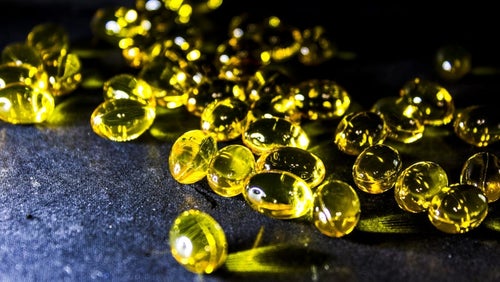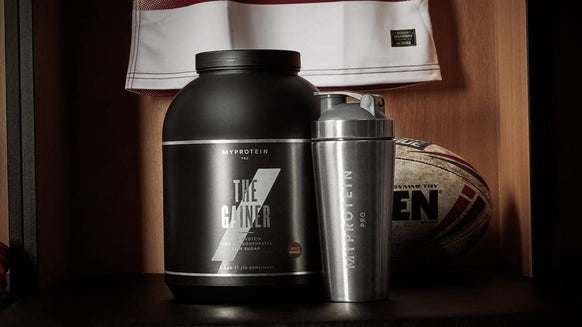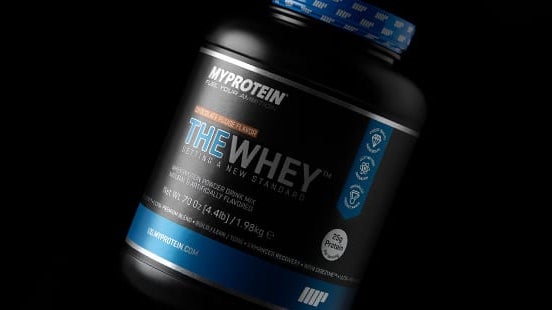
Dette er muligvis den vanskeligste balancegang, du kan finde på, når det kommer til kost - at forsøge at tabe fedt og få muskler på samme tid. Ofte er det at tabe noget fedt en god måde at blive sundere på, men hvem har lyst til at miste muskelmasse efter alt det hårde arbejde, der er lagt i at få den?
Problemet er, at når du skaber et kalorieunderskud (indtager færre kalorier end det, du forbrænder hver dag), har din krop en tendens til at forbrænde en vis mængde fedt, før den går over til at forbrænde muskler, hvilket gør, at du føler dig slankere, men desværre også svagere.
Det kan være frustrerende, når du ikke ser resultater. Medmindre du er helt ny til træning eller har holdt en lang pause, kan processen med at opbygge muskler og tabe fedt være en lang proces, der tager tid. Denne artikel vil dog hjælpe med at forklare nogle af de måder, hvorpå du kan bevare dine muskler, mens du taber fedt.
Sådan opbygger du muskler og taber fedt
1. Spis sunde fedtstoffer
Vent med den store kugle fuldfed is - det er de sunde fedtstoffer, vi er ude efter her. Kostfedt er virkelig nyttigt for at få muskler, da det kan hjælpe dig med at øge dit energiindtag og give dig ekstra brændstof til de hårdere træningspas. De er også med til at fremme produktionen af hormoner i vores krop, herunder testosteron, som kan bidrage til at øge muskelmassen.1
Inden du griber til chokoladesmørepålæg eller tilføjer mere smør til dit toastbrød om morgenen, så vælg i stedet nogle Omega-3'ere. På den måde vil du kunne tabe fedt og få muskler på samme tid.
Omega-3-fedtsyrer er fedtstoffer, der findes i fed fisk, olivenolie og nødder. De har mange formål, herunder forbedret hjertesundhed og muskelvækst.2 Faktisk har man fundet ud af, at tilskud af omega-3 fedtsyrer i seks uger resulterede i en 0,5 kg muskelvækst og 0,5 kg reduktion i fedtmasse.3
Rige fødevarekilder af omega-3 omfatter:- Laks
- Tunfisk
- Makrel
- Sardiner
- Chiafrø
- Hørfrø
- Rapsolie
Læs mere om alle fordelene ved omega-3 her...
2. Følg en proteinrig kost
Det er alt for indlysende - hvis du ønsker at opbygge muskelprotein, skal du spise mere... protein, selvfølgelig. Muskler kræver protein til deres vækst og reparation. Så fyld din tallerken med fisk, magert kød, æg, tofu, bønner og bælgfrugter samt fedtfattige mejeriprodukter. Mange kaloriefattige diæter resulterer i et lavt indtag af protein, hvilket kan resultere i dårlig vækst og tab af muskelmasse, selvom du skifter fedtstoffet ud.
Det kan være nyttigt at øge dit proteinindtag for at minimere tabet af lean body mass. Ud af en gruppe af unge, sunde eliteatleter med et højt proteinindhold tabte de, der fik en proteinrig diæt, mere vægt, mens de stadig bevarede musklerne i forhold til dem med et normalt proteinindhold i deres kost.4
Protein tager også længere tid end kulhydrater at fordøje, så det kan holde dig mæt i længere tid. Når du er mæt takket være et højere proteinindtag, er du mindre tilbøjelig til at få lyst til at få lyst til mere kalorieholdige snacks og ekstra fedt og kulhydrater. Hvis du reducerer dit samlede kalorieindtag ved at begrænse fedt og overskydende kulhydrater, kan du tabe fedt og få flere muskler.
Gode proteinkilder omfatter: - Græsk yoghurt og andre mejeriprodukter
- Kyllingebryst
- Kalkunbryst
- Hytteost
- Quinoa
- Kikærter
- Mælk
- Mandler
Begynd at nå dit proteinmål tidligt med disse proteinrige morgenmadsprodukter...
3. Gør ikke dit kalorieunderskud for ekstremt
Vil du have en sikker vej til elendighed og sandsynligvis en smule overspisning? Prøv at spise praktisk talt ingenting. Ekstrem begrænsning af dit kalorieindtag for at tabe dig er ikke gavnligt for dit vægttab, på trods af hvad du måske engang har troet. Det drastiske vægttab, du oplever, skyldes sandsynligvis snarere tab af vand og muskler end fedt.
Det er klart, at meget kaloriefattige diæter fører til et stort indledende fald i det samlede vægttab, især i den magre kropsmasse (muskler), da din krop vil bruge alt, hvad den kan, til at lave energi, herunder dine saftige biceps.6 Meget kaloriefattige diæter er ikke bæredygtige i det lange løb. Hav lidt tålmodighed, og reducer gradvist dine kalorier, så du kan bevare musklerne og din glæde.
For at bevare så mange muskler som muligt, mens du taber fedt, skal du starte med at tage et sted mellem 200-300 kalorier fra det, du anslår til vedligeholdelse dagligt, og gradvist justere alt efter, hvor hurtigt du taber dig.
Beregn et sundt kalorieunderskud for dig selv med disse 3 trin...
4. Få en dosis D-vitamin
Når du bruger al din tid mellem kontoret og træningscenteret, betyder det, at du sandsynligvis ikke optager ret mange solskinsstråler.
D-vitamin er ansvarlig for optagelsen af forskellige mineraler, herunder calcium, magnesium, fosfat og andre biologiske effekter, der er vigtige i vores krop. Det gør D-vitamin til et af de vigtigste vitaminer til at opbygge muskler og tabe fedt. Hvis din kost er fattig på D-vitamin, kan det være med til at forhindre dig i at reducere fedt og opbygge muskler.
Mangel på D-vitamin er blevet forbundet med nedsat muskelreparation og øget tab af lean body mass.7 Der er stadig behov for mere forskning i effektiviteten af D-vitamintilskud som en kraftig stimulator for muskelvækst, men resultaterne ser lovende ud. Så medmindre du træner et solrigt sted hver dag (heldigvis!), så få noget mere D-vitamin i dit system.
D-vitamin kan findes i fødevarer, bl.a. i:- Tunfisk
- Makrel
- laks
- Æggeblommer
- Ost
- Berigede fødevarer, f.eks. sojamælk og kornprodukter
Hvis du bor i Danmark, er der stor sandsynlighed for, at du ikke får nær nok sollys (det regner alt for meget her). Da solen er vores vigtigste kilde til D-vitamin, bør du måske tage et tilskud for at øge dit indtag. Nogle af os har brug for mere end andre, så spørg din læge om de bedste råd. Og hvis du er på vej ud i solen, så husk altid at bruge solcreme!
5. Lav styrketræning
For at opbygge disse guns skal du naturligvis løfte nogle vægte. Den bedste måde at forbrænde kalorier på og opbygge muskler på er at tilføje et godt styrketræningsprogram til din rutine.
Du skal fokusere på at træne hele kroppen mindst to gange om ugen - nemt nok, ikke? Sigt efter øvelser, der træner mere end én muskelgruppe ad gangen. F.eks. er squat, bænkpres, dødløft, overhead press og barbell rows er alle gode øvelser.
Compound bevægelser (som er rettet mod mere end én muskelgruppe) øger kalorieforbrændingen, samtidig med at de udfordrer dine muskler. De kræver mere energi (kalorieforbrænding) at udføre og er den bedste måde at målrette fedttab og muskelopbygning på samme tid. Dette vil gøre det lettere for dig at løfte tungere, blive stærkere eller bevare musklerne, mens du taber dig.
Prøv at sigt efter to til tre træningspas med en række compound øvelser som squat og dødløft. Og glem ikke at holde mindst én hviledag om ugen for at give din krop tid nok til at restituere og forebygge eventuelle skader.
Se vores 6 bedste restitutionstilskud til recovery, der kan hjælpe dig på vej.
Kort fortalt
Hvis du vil tabe dig og opbygge muskler, skal du fokusere på at have et kalorieunderskud, samtidig med at du får nok næring til at fremme muskelvæksten. Tænk på niveauet af protein, fedtstoffer og D-vitamin i din kost, og kombiner dette med et godt styrketræningsprogram med tilstrækkeligt mange hviledage. Dette vil sikre, at du bevarer så mange muskler som muligt, mens du fortsætter på din fedttabsrejse.
Vores artikler skal kun bruges til informative og uddannelsesmæssige formål og må aldrig tages udgangspunkt i som værende lægehjælp. Hvis du er bekymret for dit helbred, så anbefales det at konsultere en sundhedsfaglig professionel, inden du tager kosttilskud eller introducerer større ændringer i din kost. 












